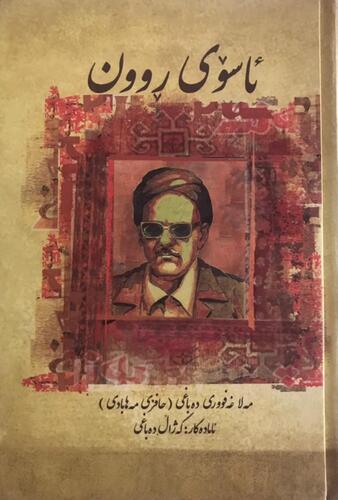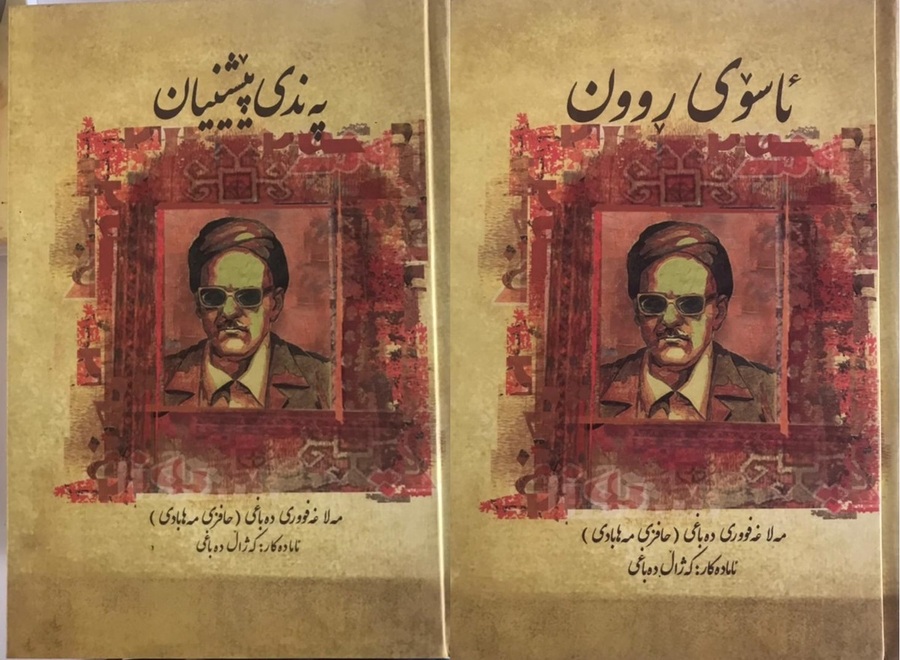Mullah Ghafoor Dabaghi, son of Darwesh Abdullah, was born in 1927 in Saqqez. A year later, his family moved to Bana and his father worked as a Dabagh (tanner), so they are known as Dabaghi. When he was a child, his father traveled to Mahabad and he got smallpox and lost eyesight because they could not get medicine.
Because of his blindness, his father educated him with the mullah in the mosque and in hujra until he finished reading the Qur'an.
In 1941, his family moved to Mahabad. There he continued his studies of religious sciences with religious teachers. He completed his interpretation of the Qur'an, Sharia, philosophy, and other sciences in the mosques of Mahabad. He began writing poetry in 1951. Initially, his poems were praises and jokes among his friends. Then, as he tells, he changed from this path in 1956 and began to write serious poetry such as ghazals, odes, and five khishtak (a poem with five verses, four of them are written by the poet and one of them is from another poet's work).
In 1956 and 1957, he became interested in Kurdish Radio of Cairo, which revived his feelings and thoughts and led to his knowledge of Kurdish literature and language. In 1958, after the July 14 Revolution in Iraq, the poet's feelings changed again and a strong Kurdish feeling entered his texts. The influence of the Kurdish revolution on Mullah Ghafoor's texts transformed him from a satirical poet into a patriotic poet and also expanded his language and world of thought.
In 1971, he learned Braille, which is designed for the blind, and thus participated in the Iranian school test and obtained his sixth-grade degree. Thus, he writes what he wants to say as poetry and records it on tape.

One of the most prominent works of Mullah Ghafoor Dabaghi is a wonderful work called "Pandi Peshinyan" (The Proverbs of Ancestors). Because of his blindness, he traveled to all the villages to collect charity. Wherever he heard a proverb, he kept it in his mind and thought about it until he finally decided in 1965 to Turn the sayings he has heard and know into poetry. That excellent book is now published in 540 pages entitled The Proverbs of Ancestors".
The language of proverbs is a fluent and easy Kurdish language. It contains proverbs from most regions of Kurdistan, especially Mukriyan, but if he used proverbs from other regions in poetry, he wrote them in Sorani. Apart from the simple and spiritual language of proverbs, Mullah Ghafoor precisely chooses a local language and paragraphs that we see examples in Kurdish songs for his poems. This work has preserved many of the proverbs of Kurdish ancestors and its language is so sweet and fluent that many of the poems have entered people’s daily language.
Some examples of proverbs that Mullah Ghafoor has translated into poetry:
1
If you ask me the truth
the rich are never aware of poor
2
Whatever you don't do is useless, sir
It is good to catch snakes with people's hands
3
Once you ate me, choke on it
If you ate me twice, enjoy it
4
It seems very stupid to me
Someone gets off a horse to ride a donkey
These examples show that Mullah Ghafoor first gets the root and purpose of the proverb, then wrote a half-verse introduction to the deep meaning of the proverb and the proverb itself in another half-verse. For instance, in the first example, the proverb is “the full is not aware of hungry”. He first gave an introduction to the proverb and then brought the proverb to make it rhythmic, so that the proverb is better spoken and remembered.

The second volume of Mullah Ghafoor Dabaghi's works, entitled Asoy Run (The Bright Horizon), contains all his poems, including ghazals, odes, five khishtak, etc. Several characteristics can be seen in Mullah Ghafoor's poems. Some of his poems are related to his personal life and talk about his suffering and poverty. In some of his poems, he wanted to make a connection between himself and the people. A beautiful part of Mullah Ghafoor's poetry is love poetry which is extremely beautiful and can be compared to the love ghazals of the best poets.
What is interesting is that although Mullah Ghafoor was blind, his descriptions of nature and women are very accurate. His expressions are fresh and poetic, and his poems have less imitation. Another part of Mullah Ghafoor's poems are poems of resistance to oppression and they are dominated by a political atmosphere and reflect the unfavorable political situation in Kurdistan.









